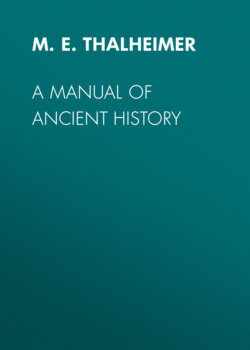Читать книгу A Manual of Ancient History - M. E. Thalheimer - Страница 17
На сайте Литреса книга снята с продажи.
ОглавлениеBC 561–559.
BC 559–555.
BC 555–538.
53. The immediate successors of Nebuchadnezzar were not his equals in character or talent. Evil-merodach, his son, was murdered after a reign of two years by Nereglis´sar, his sister’s husband. This prince was advanced in years when he ascended the throne, having been already a chief officer of the crown thirty years before at the siege of Jerusalem. He reigned but four years, and was succeeded by his son, La´borosoar´chod. The young king was murdered, after only nine months’ reign, by Nabona´dius, who became the last king of Babylon. The usurper strengthened his title by marrying a daughter of Nebuchadnezzar—probably the widow of Nereglissar—and afterward by associating their son Belshaz´zar with him in the government. He also sought security in foreign alliances. He fortified his capital by river walls, and constructed water-works in connection with the river above the city, by which the whole plain north and west could be flooded to prevent the approach of an enemy.
54. A new power was indeed arising in the East, against which the three older but feebler monarchies, Babylonia, Lydia, and Egypt, found it necessary to combine their forces. After the conquest of Lydia, and the extension of the Persian Empire to the Ægean Sea, Nabonadius had still fifteen years for preparation. He improved the time by laying up enormous quantities of food in Babylon; and felt confident that, though the country might be overrun, the strong walls of Nebuchadnezzar would enable him cheerfully to defy his foe. On the approach of Cyrus he resolved to risk one battle; but in this he was defeated, and compelled to take refuge in Bor´sippa. His son Belshazzar, being left in Babylon, indulged in a false assurance of safety. Cyrus, by diverting the course of the Euphrates, opened a way for his army into the heart of the city, and the court was surprised in the midst of a drunken revel, unprepared for resistance. The young prince, unrecognized in the confusion, was slain at the gate of his palace. Nabonadius, broken by the loss of his capital and his son, surrendered himself a prisoner; and the dominion of the East passed to the Medo-Persian race. Babylon became the second city of the empire, and the Persian court resided there the greater portion of the year.
